SRO housing, commercial urban agriculture proposals to get second look from Bloomington’s plan commission
Deliberations about where in Bloomington single-resident occupancy residences can be built will resume at the city plan commission’s next meeting on Aug. 11. The same goes for a potential ordinance that would create a new zoning district for commercial agriculture inside city limits.
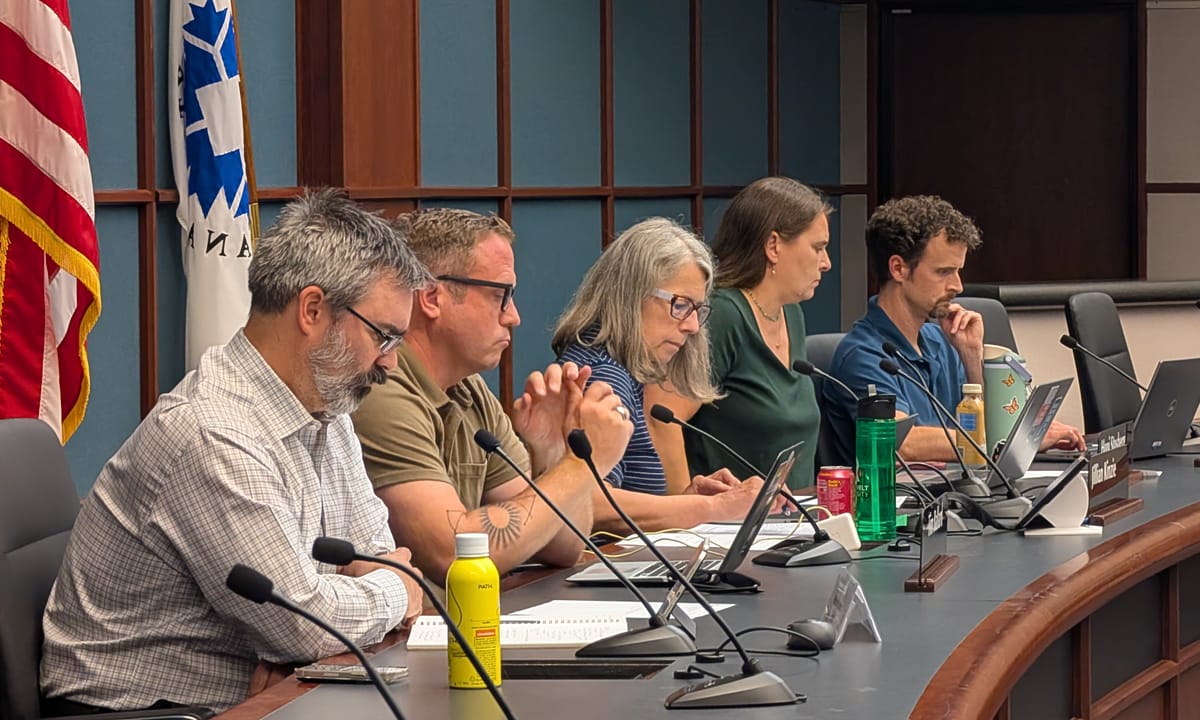
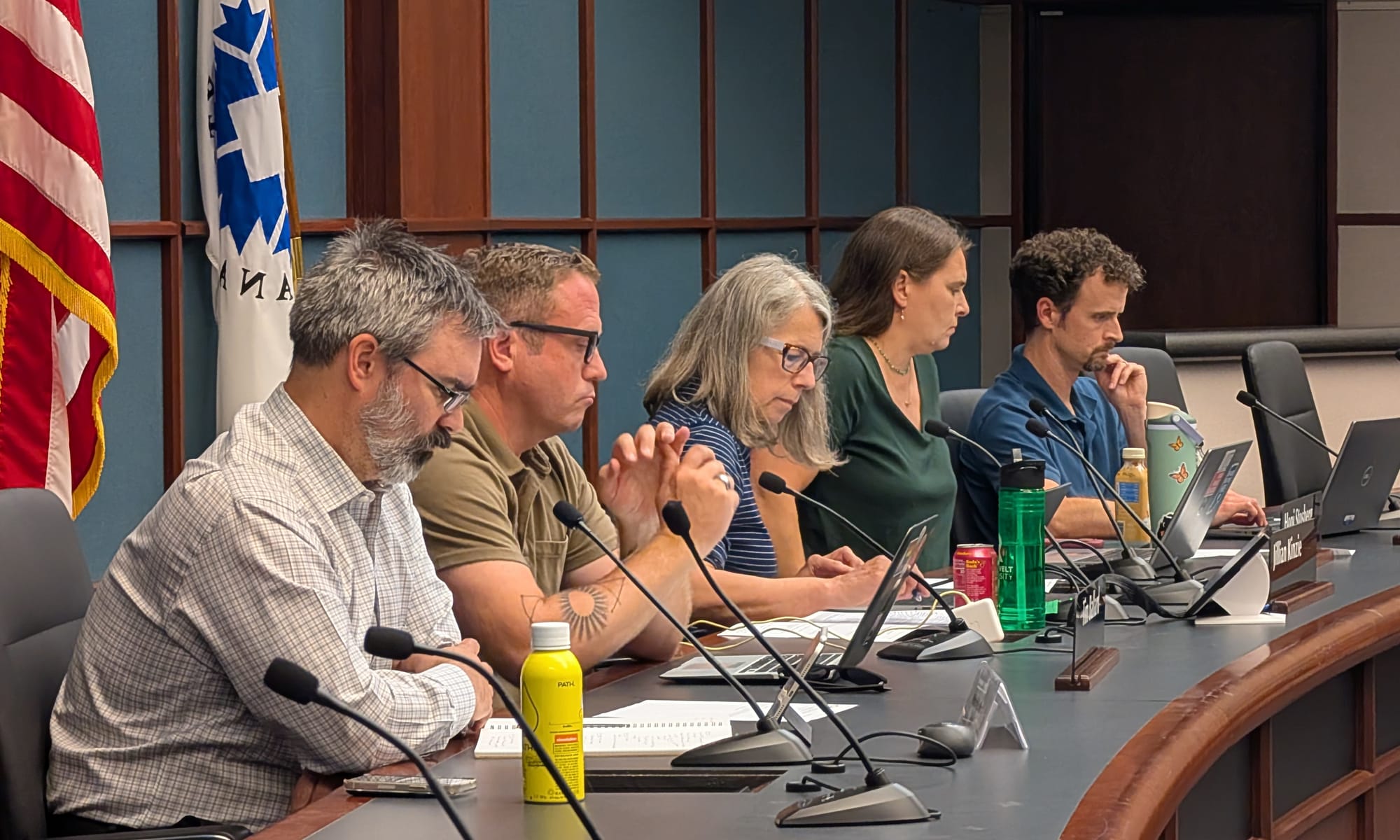
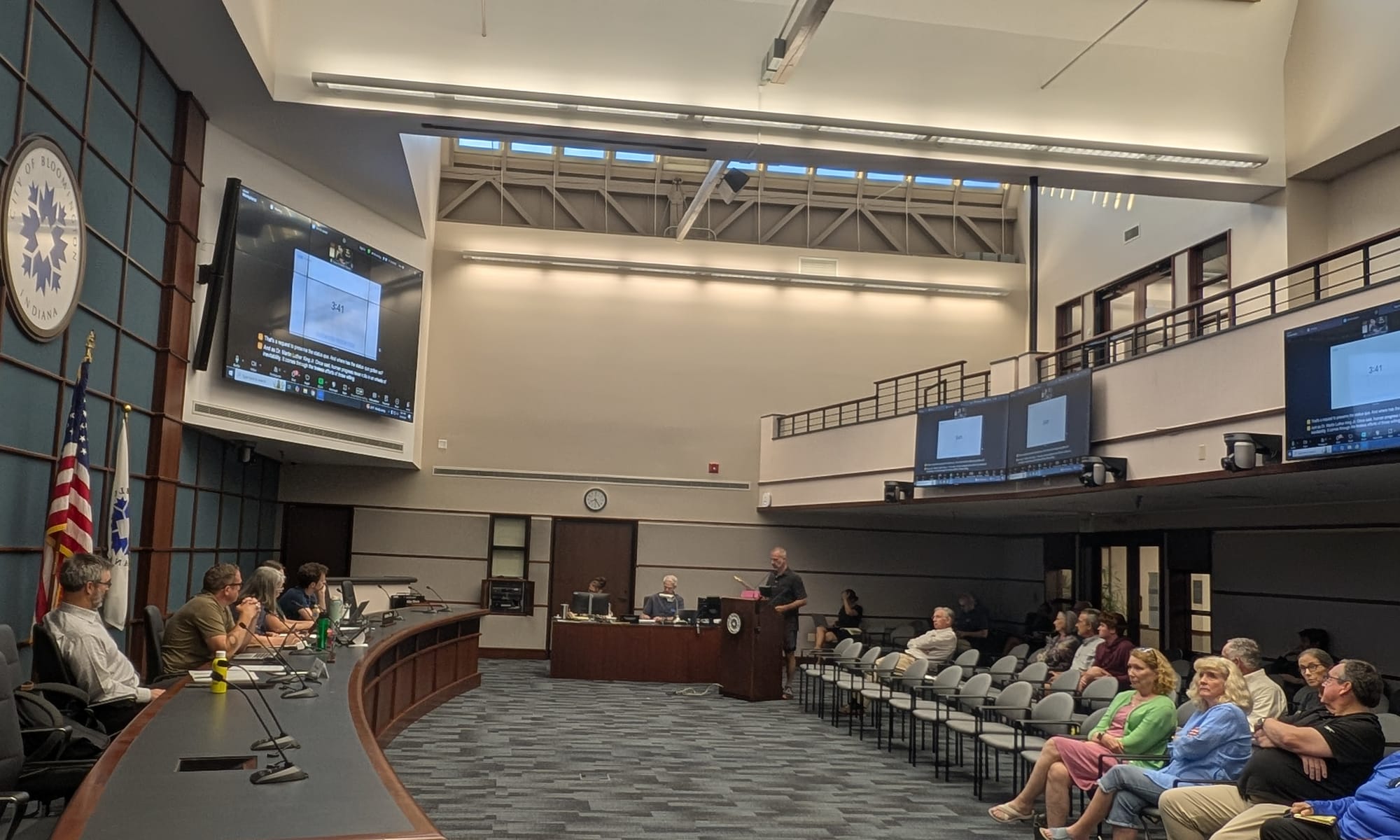
Left: Bloomington plan commission members from left: Patrick Holmes, Tim Ballard, Jillian Kinzie, Hopi Stosberg, and Andrew Cibor. Right: The Bloomington plan commission hears public comment at its July 14, 2025 meeting. (Dave Askins, July 14, 2025)
Deliberations about where in Bloomington single-resident occupancy (SRO) residences are allowed to be built will resume at the city plan commission’s next meeting on Aug. 11.
That’s based on an initial look that plan commissioners gave the proposal this past Monday. The same goes for a potential ordinance that would create a new zoning district for commercial agriculture inside city limits.
The two topics—SROs and urban agriculture—are two separate proposed amendments to the city’s Unified Development Ordinance (UDO), which the plan commission will eventually be forwarding to the city council with a recommendation, either positive or negative.
Also at Monday’s meeting, the plan commission considered five other proposed ordinance changes, covering somewhat less controversial topics, like self-storage units, fraternity and sorority housing, vehicle-related businesses, and tattoo parlors. Those ordinances all received unanimous votes among the five plan commissioners present, to send them to the city council with a positive recommendation for adoption. That required plan commissioners to waive the usual second hearing, which they did.
Several members of the public spoke on the topic of the two ordinances that the plan commission held onto for the standard second round of deliberations to be held next month.
Single Resident Occupancy (replacing “rooming houses”)
Part of the proposal that’s now being weighed by the plan commission is to rename the existing use of “residential rooming house” to “single room occupancy” (SRO).
At Monday’s meeting, the city’s development services manager, Eric Greulich, described residential rooming houses as “characterized by a situation where you have one kitchen, one bathroom facility … in a dwelling unit in a building, and then everybody just simply rents a bedroom and you share those common facilities.”
According to the U.S. Department of Housing and Urban Development, a single-room occupancy (SRO) unit includes the requirement that sanitary and food preparation facilities be shared, even if there can be living and sleeping spaces available for the exclusive use of just some residents.
Greulich said such living arrangements have existed “sporadically” throughout Bloomington. He alluded to the origins of the proposal, which came from a city council resolution that was passed in November 2024. The idea motivating the council’s effort was to achieve more places to live in the city with very low rents—specifically $500 a month or less.
The council’s resolution called for the plan commission to consider a proposal that would eliminate the owner-occupancy requirement that is currently attached to the “residential rooming house” use.
In his remarks introducing the proposal to the plan commission, Greulich foreshadowed much of the sentiment from the public mic on Monday, which centered on owner-occupancy and fears that eliminating a requirement that owners live in the building would lead to the construction of projects targeted at college students.
Greulich put it like this: “One of the challenges that we had as we were dealing with this amendment, and specifically for our challenges here in Bloomington, is how to try to address the housing needs that the council envisioned with this new change, while not just finding a way to enable more rentals and student renters within our neighborhoods.”
One way the proposal tries to overcome potential objections is to make SROs a conditional use in the R1–R4 districts and a permitted use in most other districts. In some of the zoning districts, there are use-specific standards that would include: limitations on the number of bedrooms in each dwelling unit, prohibiting bathrooms right next to sleeping rooms, spatial buffering requirements from other SRO uses, and architectural requirements for compatibility.
The impact of flagging a use as conditional is that any project that would take advantage of the use has to be reviewed and approved by the city’s board of zoning appeals (BZA). That’s similar to the approach that Bloomington has taken with duplexes in R1, R2 and R3 zoning districts, where such two-unit structures are allowed only as a conditional use, and have to be reviewed by the BZA.
Hopi Stosberg, who serves on the plan commission as the city council’s representative, asked how the health and safety of occupants could be protected, and wondered about the potential for over-occupancy. She suggested some refinement to the definition of an SRO. Defining the concept of a bedroom could help, Stosberg said: “I think it might be useful as part of this … SRO definition, to define what an SRO bedroom consists of, so that then we don’t have people trying to convert living rooms into bedrooms.”
Weighing in from the remote public mic on Monday was city councilmember Isabel Piedmont-Smith, who had sponsored the 2024 resolution that had set the proposal in motion. She shared Stosberg’s view that SROs need to be defined better so that they are not synonymous with student housing. Piedmont-Smith said, “It really doesn't seem any different than a house that’s rented to multiple students. So if there’s a way we can attach an affordability requirement to it, or some other way to distinguish it from a student house rental, then I would be in favor of that.”
At Wednesday’s city council meeting, Piedmont-Smith reprised her view that the proposal still needs work, saying that she wanted to avoid “just packing houses full of people,” adding that it was a matter of ensuring the safety of the people who live there.
Piedmont-Smith was talking about the proposal at the council’s Wednesday meeting because the council was considering a re-initiation of the same proposal about SROs that it had voted to approve in November 2024. The council’s 2024 action came with statutory deadlines, even if they were not mentioned in the resolution.
A public hearing was supposed to be held within 60 days of the council’s resolution, and a vote was supposed to have been taken by the plan commission within 60 days of the public hearing. Those statutory deadlines were not met, which led the council to re-start the process, and which will now give the plan commission a chance to meet a new set of deadlines.
On Monday, from the public mic in the council chambers where the plan commission was meeting, Thomas Payne, president of the Near West Side Neighborhood Association, expressed support for requirements for architectural conformity of SROs, especially in historic districts.
Chris Sturbaum, a former plan commissioner and city councilmember, advocated for an owner-occupancy requirement: “Allowing SROs in single family residential zones with an occupancy requirement is a great idea,” Sturbaum said. He continued, “With that requirement, the homeowner living in the house in question can rent out a room or rooms to a student or caretaker. Fantastic idea.” Sturbaum added, “But this same zoning change without an occupancy rule opens the door for investors to profit by creating over occupancy. … This works directly against home ownership, as cash investors and profit seekers outbid potential homeowners.”
Zoning for commercial agriculture
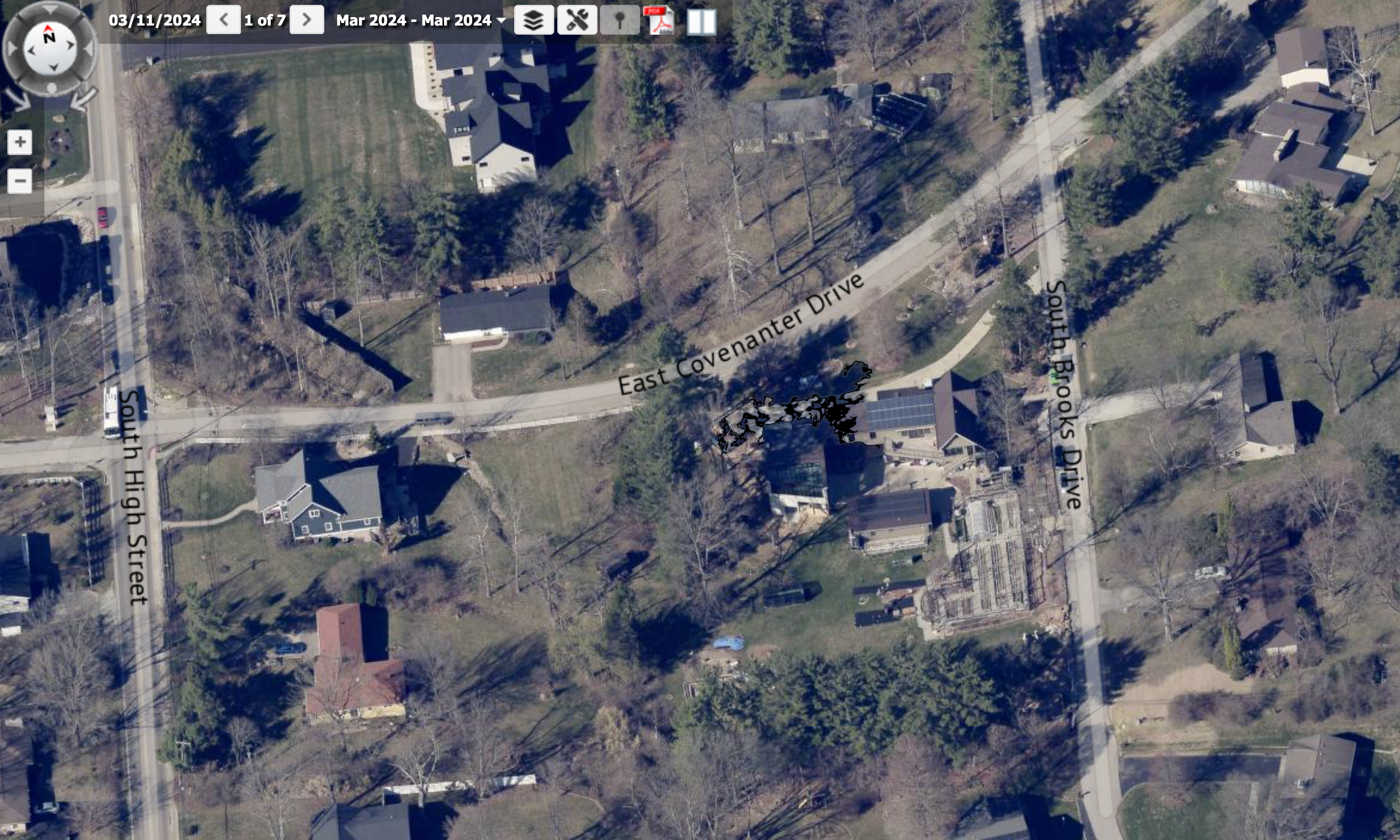
At Monday’s plan commission meeting, Bloomington’s development services manager, Eric Greulich, described the proposed amendment to the city’s Unified Development Ordinance (UDO) as allowing small-scale commercial urban agriculture—including outdoor gardening classes and on-site employees—as a conditional accessory use in residential neighborhoods.
According to Greulich, the proposed change was a response to community interest in expanding the scope of urban agriculture beyond non-commercial gardening, which is already permitted. It would create a new land use category called “urban agriculture, commercial,” which would allow limited commercial activity, such as educational workshops on residential properties. But because the accessory use would be conditional, the owner would have to get approval from Bloomington’s board of zoning appeals (BZA).
It was an adverse decision by the BZA last year that led to the proposal that the plan commission is now considering. At the BZA’s Nov. 14, 2024 meeting, the BZA considered but denied a request from Elisha Spier for her property on East Covenanter Drive to allow a “home occupation” there, so that the GardenQuest nonprofit could teach classes about urban agriculture. In broad strokes, the request was denied based on the fact that a home occupation requires the activity to take place inside the home, but Spier wanted to take students outside.
Still, Spier was able to come to an agreement with the city’s legal team that she would not challenge the BZA’s decision in court in return for the city’s consideration of a change to the UDO. The agreement mentions the Institute for Justice by name as participating in the negotiations, and the organization gets an unnamed reference in Bloomington’s informational webpage about several proposed amendments to the city’s zoning code: “This proposal was time-sensitive due to a legal agreement with a national nonprofit organization, which worked with the City’s Legal and Planning & Transportation department to ensure Bloomington clarified its rules. We’re now making good on that agreement.”
At Monday’s plan commission meeting, Spier weighed in from the remote public mic in favor of the proposal, calling the fact that the city was willing to consider it “inspirational.”
The proposal drew criticism at the public mic from Jeff Stake, a professor of law at Indiana University specializing in property and land use controls. Stake talked about the fact that people buy property relying on the legal rules that are in place when they invest, in many cases all the money they have, in their homes. Stake also worried about the effect on neighborhoods. “Allowing commercial farm uses will open a can of worms,” Stake said, adding, “It will lead to neighborhood strife, pitting neighbor against neighbor.”
Several public commenters objected to the fact that the proposal originated from consideration of a single property owner, which raises the question of whether it is a “special law,” which is prohibited by Indiana’s state constitution.
Others worried about the potential for increased traffic and parking congestion, especially on narrow streets. The required setbacks and heights allowed for greenhouses were also sources of criticism.
Weighing in for the proposal were several speakers, who echoed the sentiments of the Bloomington’s comprehensive plan. The plan says in part: “Food and agriculture offer a key opportunity to work locally and regionally to develop a more sustainable and resilient local economy that supports health, the natural world, as well as improved quality of life for residents. The City of Bloomington supports and recognizes that residents desire opportunities to produce, process, sell, purchase, and consume local foods of their choosing.”
On the plan commission, there was at least one clear voice of support, which came from Tim Ballard, who also serves on the BZA. For the Nov. 14, 2024 BZA decision, he was the only one of five BZA members who voted in support of Spier’s request.
On Monday, Ballard said, “I would encourage plan commission members to go into the comprehensive plan. … I think this amendment falls very much in line with the vision and policy of what we’re trying to move Bloomington into.”


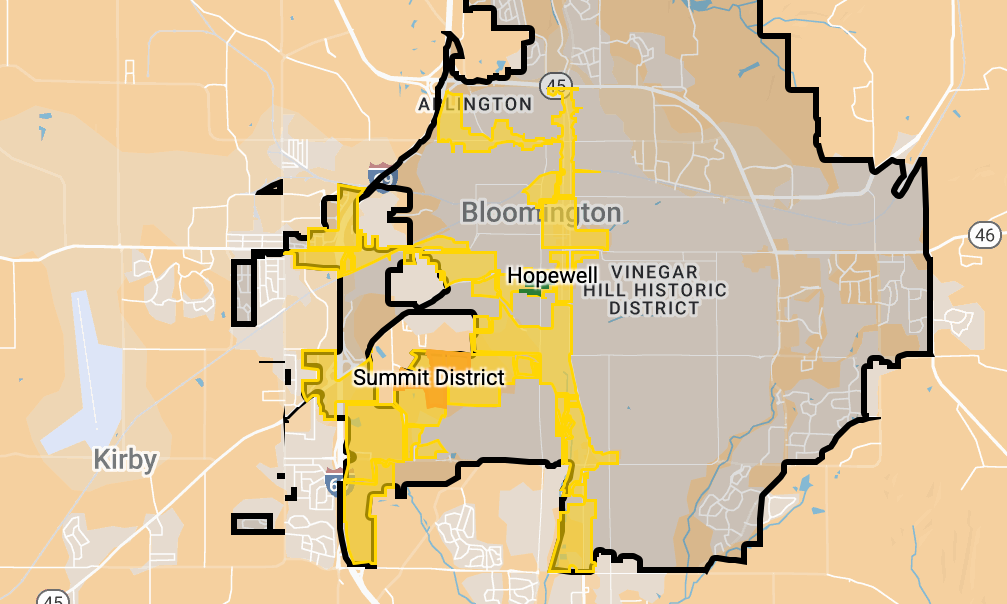

Comments ()